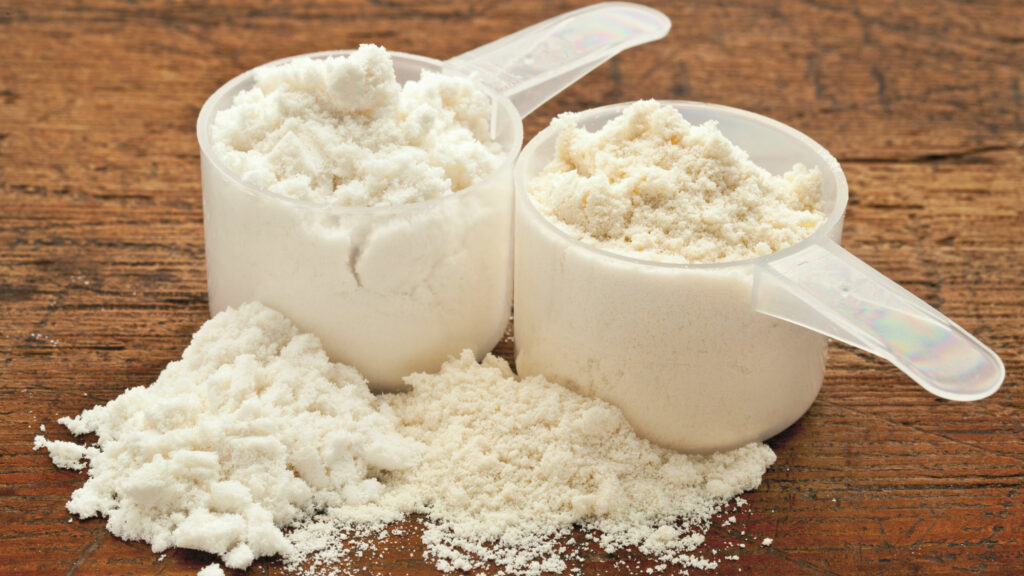Creatine and whey protein are two popular dietary supplements commonly used by athletes and fitness enthusiasts to enhance performance and muscle growth. While they have distinct mechanisms and benefits, many individuals wonder whether it is necessary or even beneficial to take both supplements simultaneously. In this comprehensive guide, we will delve into the properties, benefits, and potential drawbacks of creatine and whey protein, and help you understand whether it is advisable to use them in combination.
Understanding Creatine
- Creatine is a naturally occurring compound found in small amounts in animal products such as meat and fish. It plays a crucial role in energy metabolism, specifically in the production of adenosine triphosphate (ATP), which is the primary fuel for muscle contractions during high-intensity exercise. The body can synthesize creatine from amino acids, mainly in the liver, kidneys, and pancreas.
- When taken as a supplement, creatine monohydrate is the most common form. It is rapidly absorbed into the muscles, where it helps replenish phosphocreatine stores. Phosphocreatine is a high-energy compound that can quickly donate its phosphate group to ADP (adenosine diphosphate), forming ATP and ensuring a continuous supply of energy for muscular work.
- The primary benefits of creatine supplementation include increased strength, power output, and muscle mass. It may also enhance anaerobic performance, such as sprinting and weightlifting. Additionally, creatine has been shown to have neuroprotective properties and may benefit cognitive function.
- However, it is worth noting that the effects of creatine can vary among individuals. Some people are “responders” and experience significant improvements, while others may not experience the same level of benefits.
Exploring Whey Protein
- Whey protein is derived from milk and is a byproduct of the cheese-making process. It is considered a complete protein, meaning it contains all the essential amino acids required by the body. Whey protein is quickly and efficiently absorbed, making it an excellent option for post-workout recovery.
- The primary purpose of whey protein supplementation is to promote muscle protein synthesis, which is the process of building new muscle tissue. It provides a rich source of amino acids, particularly branched-chain amino acids (BCAAs), which are essential for muscle repair and growth. Whey protein also contains a high concentration of leucine, a key amino acid that stimulates muscle protein synthesis.
- In addition to its muscle-building properties, whey protein has several other benefits. It can aid in weight management by increasing satiety and reducing hunger, making it an effective tool for those looking to lose or maintain weight. Whey protein may also support immune function and improve antioxidant defenses.
Taking Creatine and Whey Protein Together
- Now that we have explored the individual benefits of creatine and whey protein, the question arises: should you take both supplements simultaneously? The answer depends on your specific goals and needs.
- Firstly, it is essential to understand that creatine and whey protein work through different mechanisms and offer distinct benefits. Creatine primarily enhances energy production and muscle performance, while whey protein primarily supports muscle protein synthesis and recovery. Therefore, combining these two supplements can provide complementary effects.
- If your goal is to maximize strength, power, and overall athletic performance, combining creatine and whey protein may be advantageous. Creatine will help improve your energy stores, allowing you to train at higher intensities and potentially increase muscle mass. Whey protein, on the other hand, will support the repair and growth of muscle tissue, aiding in recovery after intense workouts.
- It is worth mentioning that both creatine and whey protein are generally safe and well-tolerated supplements when used within recommended dosages. However, individual responses can vary, and it is always advisable to consult with a healthcare professional or registered dietitian before starting any new supplement regimen.
Potential Drawbacks and Considerations
- While creatine and whey protein are generally safe, there are a few considerations and potential drawbacks to keep in mind.
- Water retention: Creatine supplementation may lead to increased water retention in muscles, resulting in a slight increase in body weight. This effect is temporary and generally not a cause for concern, but individuals participating in weight-class sports should be cautious.
- Digestive issues: Some individuals may experience digestive discomfort, such as bloating or gas, when consuming whey protein. If you have lactose intolerance or milk protein allergies, it is important to choose a lactose-free or plant-based protein alternative.
- Individual responses: As previously mentioned, not everyone responds to creatine supplementation in the same way. While most individuals experience benefits, some may not see significant improvements. Similarly, some individuals may find whey protein challenging to digest or have allergies or intolerances to dairy-based products.
- Overall dietary considerations: It is important to remember that supplements should complement a well-balanced diet. While creatine and whey protein can offer benefits, they should not replace whole foods and other essential nutrients.
Conclusion
- Creatine and whey protein are two popular supplements that can have significant benefits for individuals involved in intense physical activity and resistance training. Both supplements offer distinct advantages, and when used together, they can provide complementary effects. Creatine enhances energy production and power, while whey protein supports muscle protein synthesis and recovery.
- Before starting any supplement regimen, it is crucial to assess your specific goals and needs. Additionally, consulting with a healthcare professional or registered dietitian can provide personalized guidance and ensure that the supplements are suitable for your individual circumstances.
- Remember that supplements should not replace a well-balanced diet. Adequate nutrition, hydration, and rest are essential components of optimizing performance and overall health.

